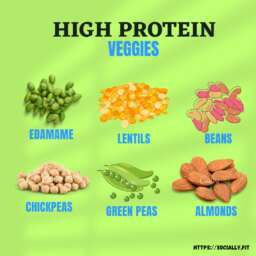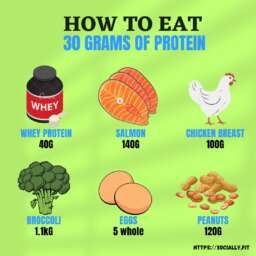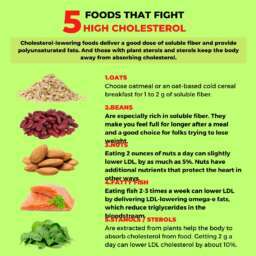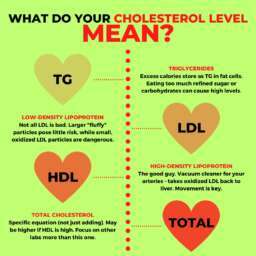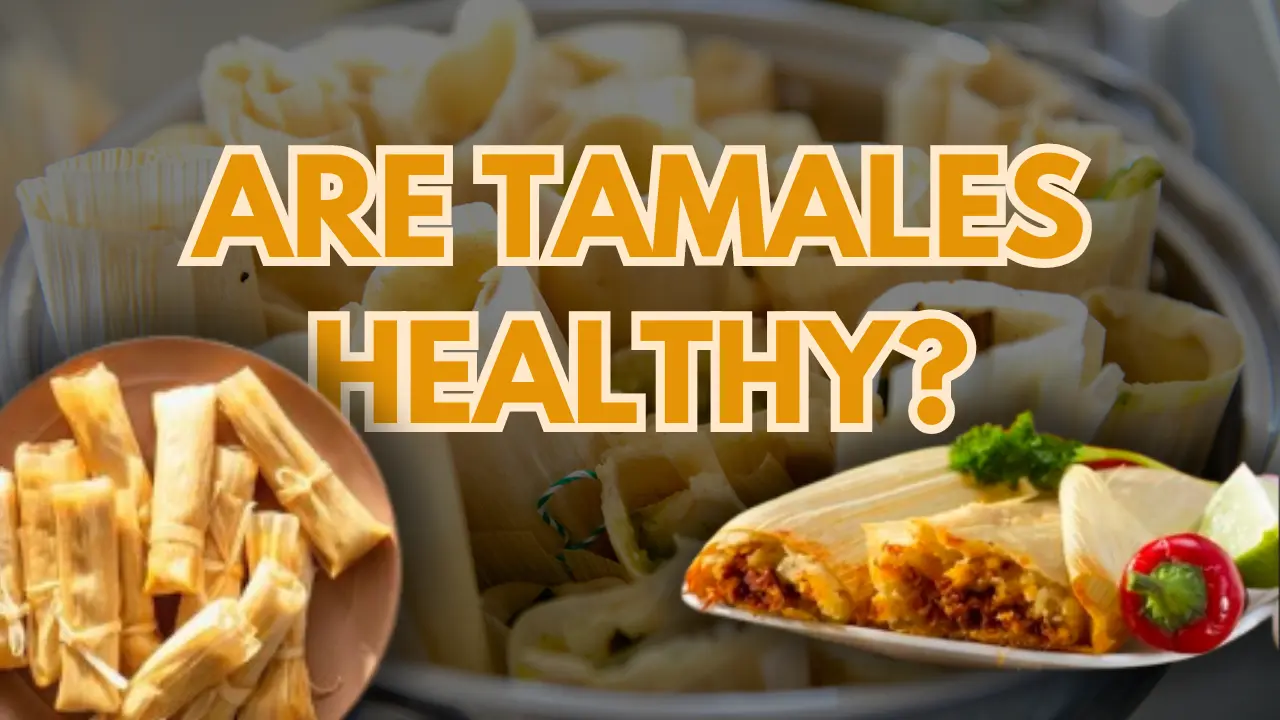Unveiling Are Tamales Healthy food?: A Delicious and Nutritious Culinary Tradition.
In the vibrant tapestry of Mexican cuisine, tamales stand out as a beloved traditional dish. These savory treats, wrapped in corn husks or banana leaves, are not only delicious but also boast a rich nutritional profile. However, concerns about their healthfulness often arise due to their preparation and ingredients. In this article, we delve into the world of tamales to explore their health benefits and address common questions regarding their place in a balanced diet.
What Are Tamales?
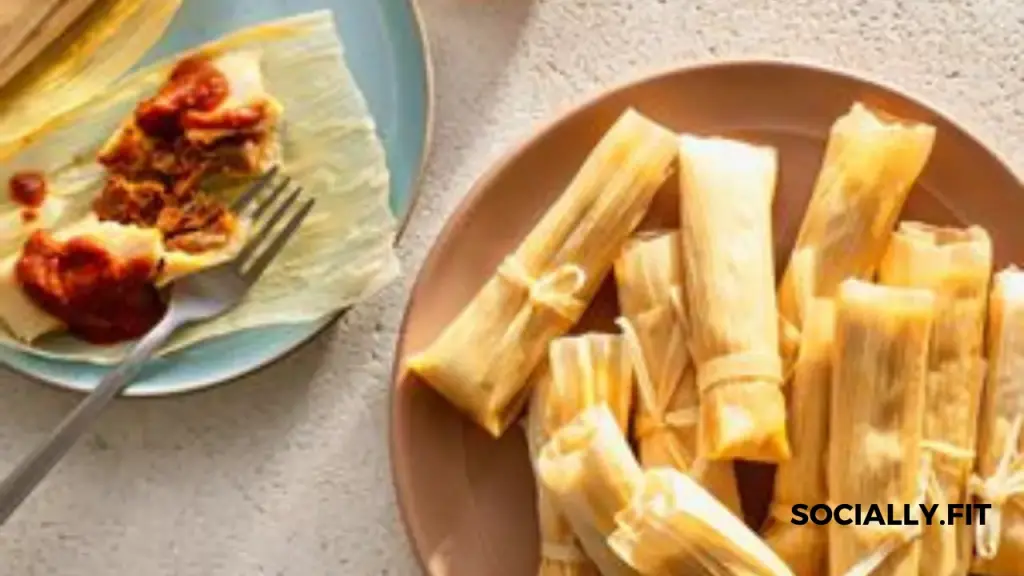
Tamales are a cherished staple of Latin American cuisine, renowned for their delicious taste and cultural significance. These savory treats consist of masa dough, a mixture of corn flour, and water, which is spread onto softened corn husks or banana leaves. The masa serves as the base for a flavorful filling, which can include a variety of ingredients such as shredded meats like chicken, pork, or beef, beans, cheese, vegetables, or chilies. After adding the filling, fold the corn husks or banana leaves meticulously to create neat parcels. Then, steam or boil the tamales until the masa is thoroughly cooked and the filling reaches tenderness. Carefully unwrap the fully cooked tamales from their husks or leaves and serve them hot, frequently accompanied by salsa, guacamole, or other condiments.
Preparation
- Prepare the masa dough by mixing corn flour with water until it reaches a smooth, spreadable consistency.
- Soak corn husks or banana leaves in warm water to soften them before assembling the tamales.
- Spread a thin layer of masa dough onto each husk or leaf, leaving space around the edges for folding.
- Add your desired filling ingredients, such as shredded meats, beans, cheese, or vegetables, to the center of the masa.
- Carefully fold the corn husks or banana leaves over the filling, sealing them to create neat parcels.
- Steam or boil the tamales until the masa is cooked through and the filling is tender, typically for about 1-2 hours.
- Allow the tamales to cool slightly before unwrapping them from their husks or leaves.
- Serve the tamales hot, accompanied by salsa, guacamole, or other condiments for added flavor.
- Store any leftover tamales in the refrigerator for up to a few days or freeze them for longer-term storage.
- Enjoy your homemade tamales as a delicious and satisfying meal or snack!
Are Tamales Healthy
The Nutritional Value of Tamales
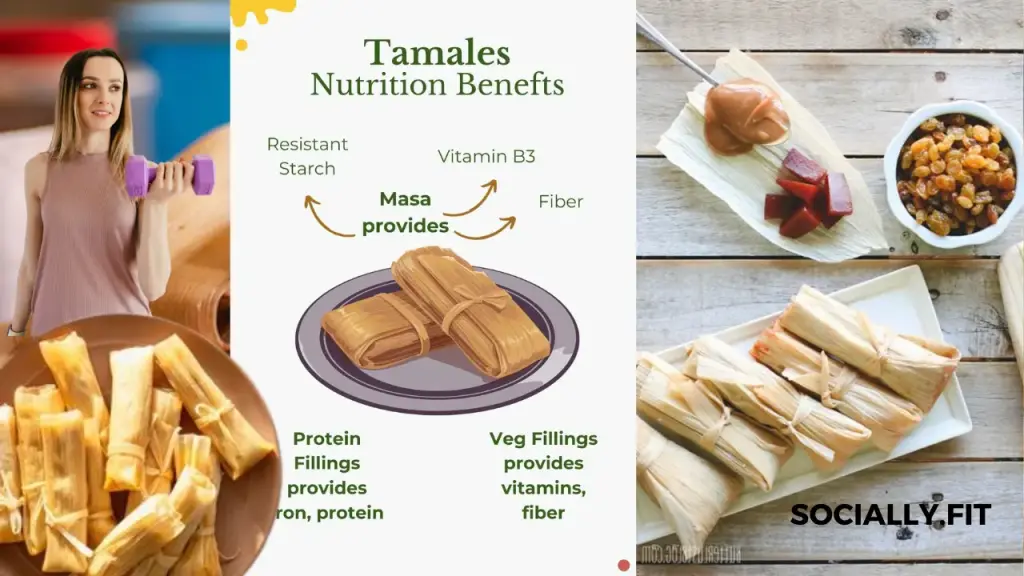
- Masa Dough: It’s important to note that corn flour, the main ingredient in masa dough, is rich in essential nutrients. Moreover, it provides complex carbohydrates, which are crucial for sustained energy levels. Furthermore, in addition to its role in providing energy, masa dough contributes to the overall texture and flavor of tamales.
- Protein Content: Typically, tamales contain protein-rich ingredients such as lean meats, beans, and cheese, which contribute to muscle repair and growth. Moreover, ingredients like lean meats, such as chicken or turkey, offer essential amino acids necessary for maintaining muscle health.
- Fiber: The combination of masa dough and fillings like beans and vegetables provides dietary fiber, aiding digestion and promoting satiety.
- Vitamins and Minerals: Tamales contain essential vitamins and minerals from ingredients like corn, meats, and vegetables, including B vitamins, iron, potassium, and magnesium.
- Moderate Fat Content: While some traditional recipes may use lard or shortening in the masa, opting for leaner fillings and minimal added fats can help moderate the overall fat content of tamales.
- Low Cholesterol: Tamales made with lean protein sources and minimal added fats are naturally low in cholesterol, supporting heart health when consumed as part of a balanced diet.
- Antioxidants: Ingredients such as tomatoes, peppers, and onions commonly used in tamale fillings contain antioxidants that help protect cells from damage and reduce the risk of chronic diseases.
- Calcium: Tamales filled with cheese provide a good source of calcium, essential for bone health and muscle function.
- Portion Control: Enjoying tamales in moderation helps control calorie intake and ensures balanced nutrition within a meal plan.
- Customization: By choosing fillings and ingredients wisely, individuals can customize tamales to suit their dietary needs and preferences, making them a versatile and nutritious option.
Are Tamales Healthy
Are Tamales Healthy?
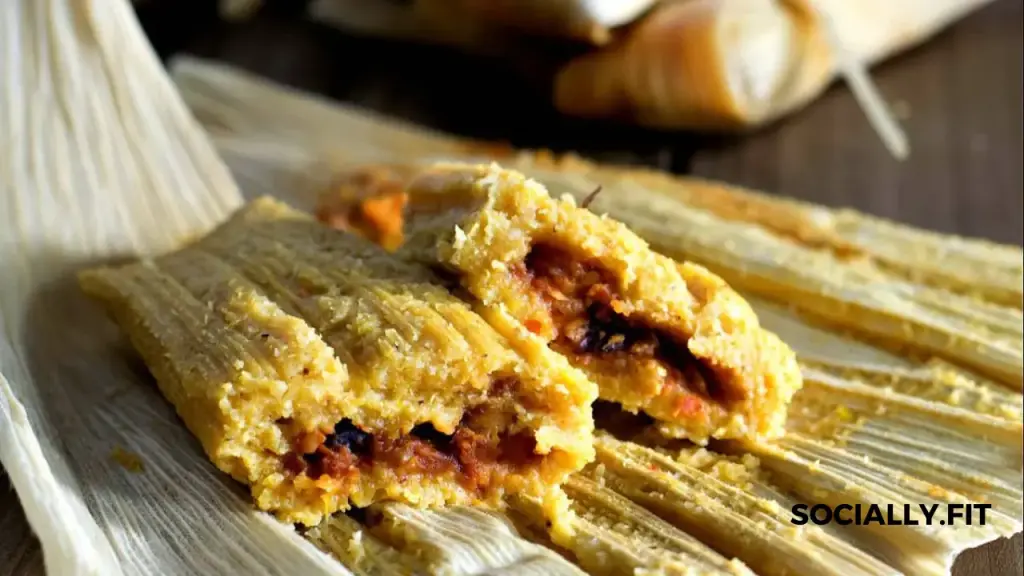
Tamales, a traditional dish in Latin American cuisine, can indeed be a healthy option when prepared with nutritious ingredients and consumed in moderation. Scientific research supports the health benefits of key components found in tamales, such as corn masa, lean proteins, and vegetables.
Scientific Proof:
- Corn Masa: Corn masa, the main ingredient in tamales, is rich in complex carbohydrates, fiber, and essential nutrients such as vitamin B and iron. According to studies published in the “Journal of Agricultural and Food Chemistry,” corn contains antioxidants that may help protect against chronic diseases like cancer and heart disease.
- Lean Proteins: Tamales filled with lean proteins like chicken, turkey, or beans provide essential amino acids necessary for muscle repair and growth. Research published in the “American Journal of Clinical Nutrition” suggests that diets high in lean protein can aid in weight management and improve overall metabolic health.
- Vegetables: Typically, tamales include a variety of vegetables such as peppers, onions, and tomatoes, which are rich in vitamins, minerals, and antioxidants. Moreover, vegetables like peppers, onions, and tomatoes provide essential nutrients that support overall health. Additionally, research indicates that the antioxidants found in vegetables may help protect against chronic diseases. Furthermore, diets high in vegetables promote optimal health and well-being.
Why Tamales Are Healthy?
- Nutrient-Rich Ingredients: Incorporating wholesome ingredients like corn masa, lean proteins, and vegetables into tamales provides essential nutrients such as carbohydrates, protein, fiber, vitamins, and minerals necessary for overall health.
- Antioxidant Properties: Corn masa and vegetables in tamales contain antioxidants that help protect cells from damage caused by free radicals, reducing the risk of chronic diseases like cancer and heart disease.
- Lean Protein Sources: Choosing lean protein sources such as chicken, turkey, or beans for tamale fillings provides essential amino acids for muscle repair and growth while reducing saturated fat content.
- Fiber Content: The combination of corn masa and vegetable fillings in tamales provides dietary fiber, promoting digestive health, regulating blood sugar levels, and contributing to feelings of fullness.
- Low in Cholesterol: Tamales made with lean proteins and minimal added fats are naturally low in cholesterol, supporting heart health and reducing the risk of cardiovascular disease.
- Portion Control: Enjoying tamales in moderation helps control calorie intake and ensures balanced nutrition within a meal plan, preventing overconsumption of calories and excessive fat intake.
- Customization: By choosing fillings and ingredients wisely, individuals can customize tamales to suit their dietary needs and preferences, making them a versatile and nutritious option for a balanced diet.
Are Tamales Healthy
Advantages
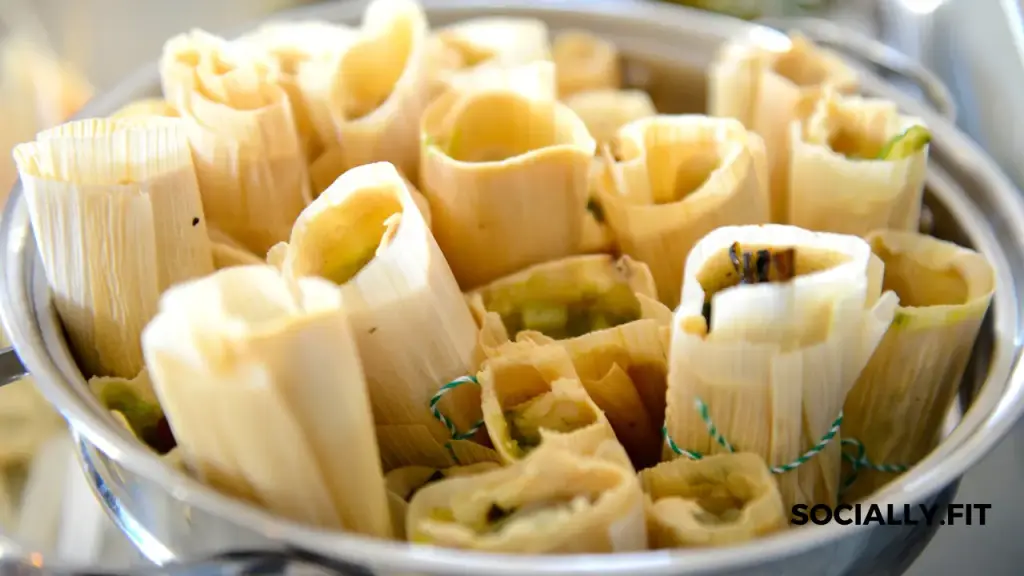
- Nutrient-Rich: Tamales commonly feature a diverse range of nutritious ingredients, including lean proteins, vegetables, and whole grains, thereby offering essential nutrients to the body.
- Portable and Convenient: Tamales are wrapped and steamed individually, making them easy to carry and consume on the go, perfect for busy lifestyles.
- Versatile: Tamales can be filled with a wide range of ingredients, allowing for endless flavor combinations to suit different tastes and dietary preferences.
- Cultural Significance: Tamales hold cultural significance in many Latin American countries, serving as a symbol of tradition and community during festive occasions and celebrations.
- Economical: Tamales are often made in large batches, making them a cost-effective option for feeding a crowd or stocking up for future meals.
- Freezable: Tamales freeze well, allowing for convenient meal prep and storage for later consumption without compromising taste or texture.
- Diverse Preparation Methods: Tamales can be prepared using various cooking methods such as steaming, boiling, baking, or grilling, offering flexibility in culinary techniques.
- Customizable: Individuals can customize tamales according to their dietary needs and preferences, whether they are gluten-free, vegetarian, or low-fat.
- Community Bonding: Making tamales is often a communal activity, bringing family and friends together to share in the preparation and enjoyment of this traditional dish.
- Satiety: Tamales are filling due to their combination of complex carbohydrates, protein, and fiber, helping to promote feelings of fullness and satisfaction after consumption.
Are Tamales Healthy
Disadvantages
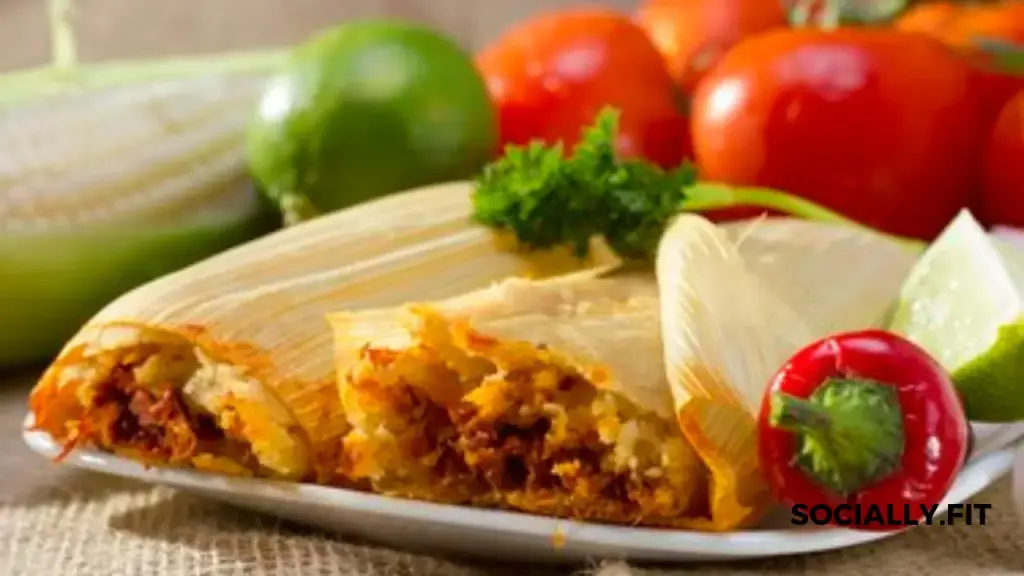
- High in Calories: Traditional tamales can be calorie-dense, especially when prepared with high-fat fillings or excessive amounts of oil or lard in the masa.
- High in Sodium: Some commercial or homemade tamales may contain high levels of sodium, particularly if they are seasoned heavily or filled with processed meats or cheeses.
- Potential Allergens: Tamales may contain common allergens such as wheat (in the masa) or dairy (in certain fillings), posing risks for individuals with food allergies or sensitivities.
- Labor-Intensive Preparation: Making tamales from scratch requires time-consuming preparation, including soaking corn husks, making masa dough, and assembling the fillings, which may deter some people from making them at home.
- High in Saturated Fat: Traditional recipes for tamales often include lard or shortening in the masa, contributing to their high saturated fat content, which can negatively impact heart health when consumed in excess.
- Risk of Contamination: Improper handling or storage of tamales can increase the risk of foodborne illness, particularly if they are not cooked thoroughly or stored at unsafe temperatures.
- Limited Availability: Tamales may not be readily available in all regions or supermarkets, making them less accessible to individuals outside of areas with a strong Latin American culinary presence.
- Environmental Impact: The production of certain ingredients used in tamales, such as corn or meat, may have environmental implications, including water usage, land degradation, and greenhouse gas emissions.
- Cultural Appropriation: Appropriation of traditional foods like tamales by mainstream culture without proper acknowledgment of their cultural significance can perpetuate harmful stereotypes and erasure of indigenous culinary traditions.
- Potential Overconsumption: Due to their delicious taste and cultural allure, individuals may be tempted to overconsume tamales, leading to excessive calorie intake and potential weight gain if not consumed in moderation.
Are Tamales Healthy for You?
Are Tamales Healthy for You?
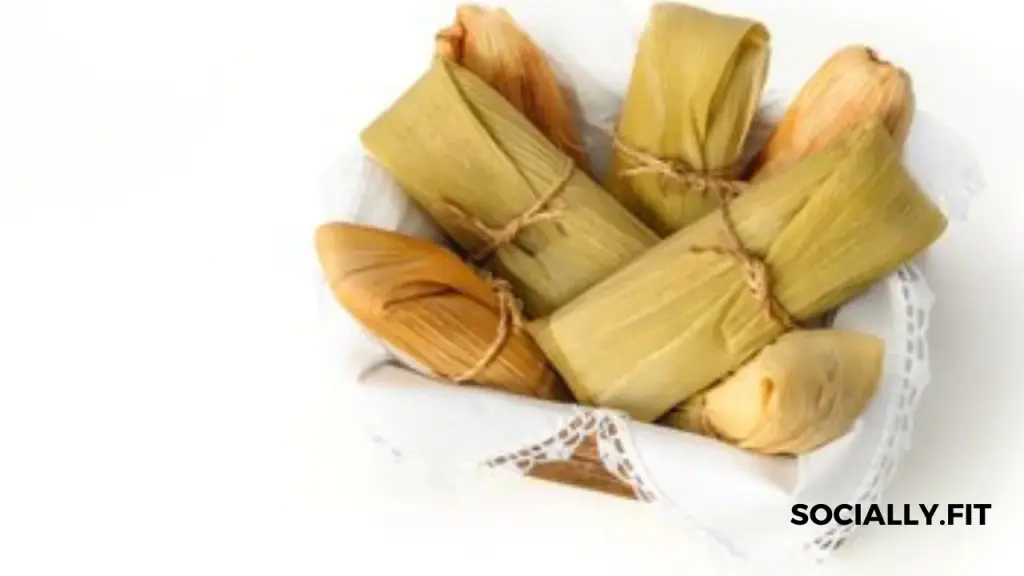
Yes, tamales can be healthy for you when prepared with nutritious ingredients and consumed in moderation. Tamales are typically made with corn masa, which provides complex carbohydrates, fiber, and essential nutrients. Additionally, fillings such as lean proteins like chicken, turkey, or beans, along with vegetables, contribute to the nutritional value of tamales by providing protein, vitamins, minerals, and antioxidants. However, it’s essential to be mindful of portion sizes and ingredient choices, as traditional recipes may include higher amounts of fat or sodium. Overall, when made with wholesome ingredients and enjoyed as part of a balanced diet, tamales can be a nutritious and satisfying meal option.
Are Tamales Healthy for You?
Can Tamales Be Part of a Healthy Diet?
Absolutely, tamales can be part of a healthy diet when enjoyed in moderation and as part of a balanced meal plan. Their combination of complex carbohydrates, protein, fiber, and various nutrients makes them a nutritious choice. However, moderation is key, as excessive consumption may contribute to unwanted weight gain or health issues. Additionally, incorporating lean protein and vegetable fillings, and opting for healthier preparation methods, such as using vegetable oils instead of lard, can enhance their nutritional profile. In conclusion, tamales can be enjoyed as part of a diverse and balanced diet.
Are Tamales Healthy for You?
Are Tamales High in Calories?
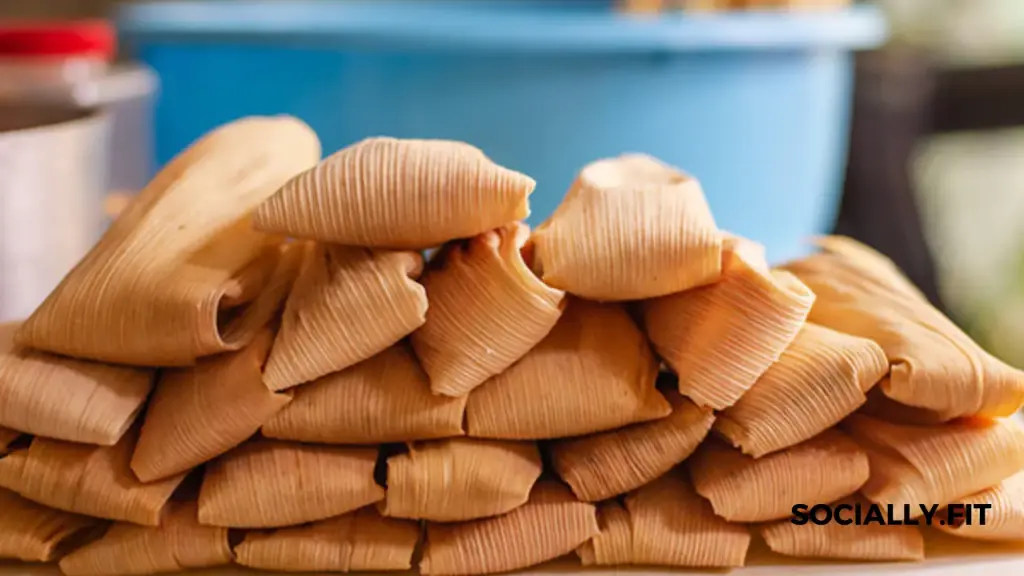
While tamales are moderately calorie-dense due to their corn masa base and filling ingredients, their calorie content can vary based on portion size and ingredients. Indeed, the calorie content of tamales can be influenced by factors such as portion size, filling ingredients, and preparation methods. Additionally, portion size plays a crucial role in determining the overall calorie intake, with smaller portions naturally containing fewer calories. Moreover, opting for lighter fillings such as vegetables or lean meats can help reduce the calorie content of tamales while still providing essential nutrients. Furthermore, choosing healthier preparation methods, such as steaming or baking instead of frying, can further lower the calorie content of tamales without compromising taste or texture. In summary, by being mindful of portion sizes, filling choices, and preparation methods, individuals can enjoy tamales as part of a balanced diet while managing their calorie intake effectively.
In summary, while tamales can contribute to daily calorie intake, mindful portion control and ingredient choices can help manage their calorie content.
Are Tamales Healthy for You?
What Are Some Healthier Alternatives to Traditional Tamales?
For those seeking healthier alternatives to traditional tamales, several options are available. Alternatively, individuals can experiment with alternative ingredients such as whole grain flours or gluten-free substitutes for masa. Moreover, exploring vegetarian or vegan fillings, such as beans, lentils, or roasted vegetables, can add nutritional variety and reduce saturated fat content. Additionally, experimenting with lighter cooking methods, such as baking or grilling, can further enhance the healthfulness of tamales. In conclusion, by incorporating alternative ingredients and cooking methods, individuals can enjoy tamales with a healthier twist.
Are Tamales Healthy for You?
Are Tamales Gluten-Free?

Indeed, tamales made with traditional corn masa are naturally gluten-free, making them suitable for individuals with gluten sensitivities or celiac disease. However, individuals should exercise caution when purchasing or consuming tamales from commercial sources, as cross-contamination with gluten-containing ingredients may occur during preparation. Moreover, it’s important for those with gluten sensitivities to verify the ingredients and preparation methods of tamales to ensure they are free from gluten. Additionally, those preparing tamales at home can use certified gluten-free ingredients to accommodate dietary restrictions. In summary, while traditional tamales are gluten-free, individuals should remain vigilant to avoid potential sources of gluten contamination.
Are Tamales Healthy
How Can I Make Healthier Tamales at Home?
To create healthier tamales at home, individuals can make several modifications to traditional recipes. Additionally, individuals can experiment with alternative ingredients such as whole grain flours, such as quinoa or amaranth, to boost fiber and nutrient content. Moreover, experimenting with lean protein sources such as chicken breast, turkey, or seafood can reduce saturated fat content while adding essential nutrients. Furthermore, incorporating a variety of vegetables, herbs, and spices can enhance flavor and nutritional value without compromising healthfulness. In conclusion, by making simple substitutions and additions, individuals can enjoy homemade tamales that are both delicious and nutritious.
Are Tamales Healthy
Conclusion

In conclusion, tamales are not only a delicious culinary tradition but also a nutritious addition to a balanced diet. With their blend of complex carbohydrates, protein, fiber, vitamins, and minerals, tamales offer a satisfying and wholesome meal option. While concerns may arise regarding their healthfulness, mindful ingredient choices, portion control, and preparation methods can enhance their nutritional profile. By incorporating tamales into a diverse and balanced diet, individuals can savor the flavors of this beloved dish while nourishing their bodies.
Are Tamales Healthy








